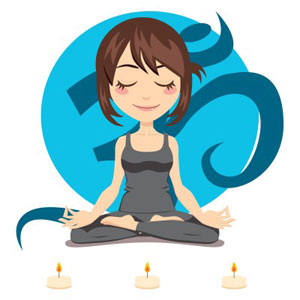Poker – The Key to Controlling Your Emotions
 Poker knowledge means little if you do not have the rationality to apply it a for the majority of the time.
Poker knowledge means little if you do not have the rationality to apply it a for the majority of the time.
For most poker players, some form of tilt or steaming is unavoidable, but most players lose control of their emotions far too easily and this costs them heavily.
So in this article I’m going to explain the key to keeping your poker emotions under control.
We’ll look at what preparation you can do before you play, and what steps you can take whilst playing to ensure that the risk of slipping towards poker tilt is minimised.
So… if you’re all sitting comfortably on the floor… with your legs crossed, take a deep breath and close your eyes…. oh no wait, you won’t be able to read this if you have your eyes shut… you’d better open them again!
Preparation Before You Play
Preparation before you even get to the poker tables is very important. If you mentally prepare yourself, you will be much better placed to deal with whatever Poker throws at you, and believe me it will try to throw lots of things at you!
A. Understand your Motivation for playing Poker
What is your reason for playing poker?
- Do you play poker as an exercise of mental competition?
- Do you play it for social reasons?
- Do you play it purely to make money?
Once you identify why you play the game, you can better understand why you sometimes lose control of your emotions when you play poker.
For a player motivated by the mental challenge, it can become frustrating when they get outplayed, or when they are outplaying an opponent but then get sucked out on.
For social players, tilt can be caused by an antagonistic player at the table or other disruptions to their social environment.
Lastly and most obviously, players who are motivated by money are going to become unsettled when they start to lose money beyond a certain point.
B. Mentally prepare yourself for all outcomes
When you are about to sit down in a cash game, you know that in the long run you expect to win, but you also know that there are going to be winning and losing sessions. If you have played at the particular limit before, you are generally going to have an idea of the potential upswings and down swings you can experience in a single session.
Say you are playing a no limit or pot limit game, knowing your past history at these stake levels you know the following:
- Most of your sessions have been results of between plus and minus one buy-in.
- There are then a scattering of times that you’ve won or lost more than this, say two or three buy-ins.
- Finally there was that one session you completely lost the plot and dropped 8 buy-ins.
Before you sit down at the table you should be prepared that any of those scenarios could happen again today. You don’t know what type of session you are going to have and you have to ask yourself are you in the physical and emotional state to be able to deal with being a few buy-ins down for the session with no escape in sight? If you’re not in the right frame of mind, then get out now, don’t sit down at the poker table, find something else to do.
Envisioning what could potentially happen really does help deal with whatever outcome does occur. If you do end up having a big losing session, you have already considered some of the thoughts and feelings you will be experiencing and dealt with them. If you have a big winning session then you have already prepared yourself not to get over excited and just realise that it is all part of the ups and downs of the game. No sooner do you start feeling like you are on top of the world playing poker, it can knock you back down again at any moment.
While You Play
Losing control of your emotions (or “Tilt” as it is so endearingly called by poker players) is most destructive when it begins to snowball. What starts out as a few nasty little beats for small pots getting to you suddenly becomes over aggression, lack of patience, frustration and whatever else you do when you get emotional disturbed playing poker.
A. Debrief after the session… NOT during it
The key with Poker Tilt is to constantly monitor and be aware of your emotions as you progress through a session. If a particular hand is bothering you, review it, identify what exactly went wrong, deal with it and then get over it.
If you couldn’t have played it any better then what is the point wasting mental energy on being annoyed about it when you could be spending that energy on playing current and future hands. If you could have played it better then there is no point in getting annoyed at yourself while you are still in the game.
De-brief yourself about your mistakes after you have finished playing and just concentrate on the new situation that is facing you at the table whilst a session is in progress. If you are unable to do this, take a break from the game de-brief yourself and then re-enter with a fresh perspective.
B. Take a Long Run View
Remind yourself as you play that the game is scored in the long run, a single hand, round or session means little in the overall scheme of things. If you get particularly unlucky in a hand, think back to a time where you yourself got lucky in a hand, bring things into perspective for yourself.
C. Know when it’s time to Quit
Sometimes the session is so bad, or your mental state is getting to the point where it is so out of whack that it really is the best thing for you to just completely walk away from poker for a bit.
You may just need a hours break, or if it is emotions from poker that have built up over time you may need a complete break from poker for a while, say a week or a month. This way you can let those emotions dissipate and fade away, so that you can return to Poker with a fresh perspective and ready to enjoy yourself again.
Even for experienced poker players this is a very hard thing to do, but there are just some days where your emotional state has deteriorated such that there is no hope for you playing winning poker. If you don’t walk away there will only be one outcome, and that’s not a very pretty one.
And Relax…
Ok, you can get up of the floor again now and bring yourself out of the trance like state you have been in, we are done for today, but I hope you found the above helpful and you too can achieve Poker “Inner Peace”.

Trust & Security
I'll only recommend Safe & Trusted sites with a proven track record
By Game Type
Different rooms are better for different game types & stakes
Beginner Friendly
I'll find you a site with players of a similar skill level
Promotions
I'll find you the best value Promotions, Bonus & Freebies!

 Return to the
Return to the 
